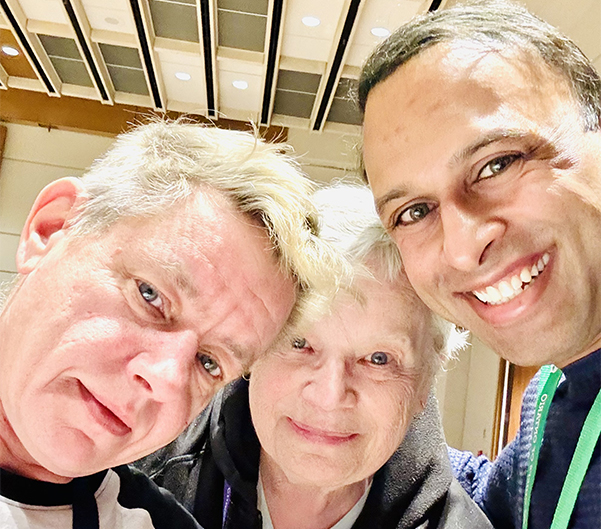Don’t use alone. Use the phone.

Two people in Alberta die every day from drug overdoses, more than the combined daily fatalities from car accidents, homicides, and heart attacks.
This alarming statistic led internist and addictions specialist Dr. Monty Ghosh to research overdose prevention. He found that 50 to 80% of all drug overdoses occur when people are using alone, typically in private settings like their homes or hotel rooms. “These are hidden substance users” he said, “people who do not use supervised consumption sites because of distance, safety concerns or fear of being recognized.”
Dr. Ghosh wanted to develop a service to protect people in these hidden, high-risk situations. It was a patient in Grand Prairie that sparked an idea. When Dr. Ghosh asked the patient if he used alone, the response was surprising: “Kind of,” his patient said, explaining that he would connect on FaceTime with a friend in Edmonton while using, and if one of them overdosed, they would call 911 and provide the other’s address to the dispatcher.
Soon after, Dr. Ghosh started the National Overdose Response Service (NORS) hotline in partnership with Rebecca Morris-Miller, the founder of a similar hotline and community outreach service in Hamilton. NORS stems from Dr. Ghosh’s experience with patients and Rebecca’s own lived experience with addiction, which tragically ended her life in 2022, two years after NORS began taking calls. Rebecca’s sister, Lisa Morris-Miller, now leads the organization, carrying forward Rebecca’s legacy and the shared vision of providing life-saving support to people at risk of overdose.
NORS, Canada’s first and only drug overdose prevention hotline, connects callers with paid operators who monitor them while they take drugs. If the caller becomes unresponsive, the operator dispatches emergency medical services to assist them.
Dr. Ghosh has been evaluating NORS to study the effectiveness of virtual supervised consumption services and their impact on reducing overdose deaths in Canada.
To date, NORS has received more than 20,000 phone calls, 170 of which involved overdoses; none resulted in deaths. Three quarters of callers are women or transgender, whereas mostly men use supervised consumption sites. But what surprised Dr. Ghosh was that the NORS operators were providing mental health support, as much as supervising consumption. “That is because they are former substance users themselves,” explains Dr. Ghosh. “The NORS line is supported by peers, people who have lived experience of substance use, who have walked the walk and, therefore, can talk the talk. I think that is the secret sauce of the program.”
Dr. Ghosh is interested in conducting more research, but based on his findings so far, he is convinced that remote overdose monitoring services are effective at protecting people who use drugs alone.
“I'm hoping that eventually every person leaving a hospital, detox facility or treatment centre is reminded not to use alone and is provided with the number of an overdose monitoring service like NORS,” he said. “Their lives depend on it.”
At a glance
Issue
From 2016 to 2022, opioid-related deaths in Canada increased by more than 300%, leading to higher healthcare costs, strained emergency services and long-term social and economic impacts. Most drug overdoses occur when people use drugs alone in their home, car or hotel room.
Research
Dr. Monty Ghosh, addictions specialist and assistant clinical professor at the University of Calgary and the University of Alberta, co-founded an overdose prevention hotline to monitor individuals using drugs alone. He collaborated with people with lived experience and community members in the design, implementation and dissemination of the research.
If you or someone you know is struggling with substance use or may be at risk of overdose, please call or text NORS: 1-888-688-6677.
- Date modified: